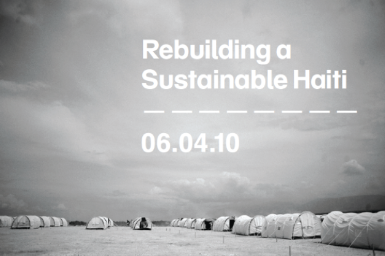

Starting: June 4th, 2010 — 1:00pmEnding: June 10th, 2010 — 6:00pm
The Cooper Union
The Cooper Union, Cooper Square, New York, NY, United States
The scope of the destruction that followed the January 12 earthquake in Haiti was so great that the rebuilding process must seek to transform the country’s built environment, not just replace it. The quake’s effects were clearly magnified by informal building practices and the concentration of people and industry in Port-au-Prince, while the environmental damage caused by widespread deforestation exacerbates the risks inherent in an agriculture-heavy economy. The financial losses are estimated at $7.86 billion, or 120% of the country’s entire 2009 GDP, and more than half of that sum represents physical assets like houses, roads, schools, and hospitals.
Overcoming such challenges will require an extraordinary commitment of energy, coordination, resources, and imagination, and the country’s long-term welfare depends on a new and comprehensive approach to planning. In developing the Action Plan for the Reconstruction and National Development, the Haitian government has developed a framework for the future, and our purpose in convening Rebuilding a Sustainable Haiti today is to launch critical discussions on how we as a community can work within that framework to help make the rebuilding process a truly progressive and integrated one. We hope it will serve as the foundation for long-term and productive relationships between the extraordinary design and planning community here and NGOs, local governments, and institutions that are already at work in Haiti.
On June 4, 2010, the Institute for Urban Design hosted Rebuilding a Sustainable Haiti symposium with a stellar roster of speakers addressing the complex challenges facing the country today and over the next twenty years. From Ambassador Leslie Voltaire’s comprehensive presentation of the Haitian government’s Action Plan; to Ami Desai of the Clinton Foundation’s thoughtful discussion of the potential and limits of donor aid; to David Evans of UN-HABITAT’s talk on lessons the development community has learned from prior disasters, and concern that they aren’t always applied; to Louis Herns Marcelin of INURED’s critique of the top-down nature of many needs-assessment efforts; the conversation was a far-ranging and compelling one.
Leave a Reply
You must be logged in to post a comment.